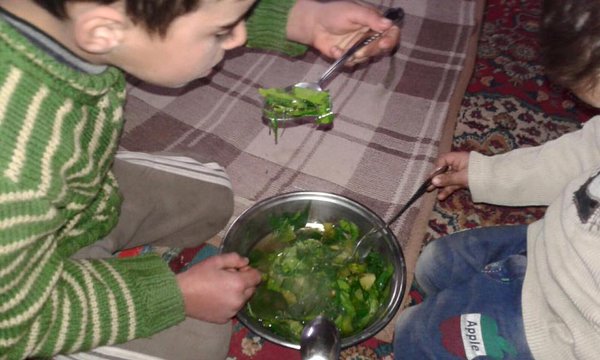PHOTO: A boy eats a meal of grass and leaves in Madaya, before this week’s arrial of aid
As aid finally reaches Madaya, northwest of Syria’s capital Damascus, Anne Barnard and Hwaida Saad write for The New York Times about lives of those facing starvation in the town besieged by the regime military for six months:
Nisrine kept teaching school for months as the siege tightened around the Syrian town of Madaya, but had to give up a few weeks ago when her students got too weak from starvation to walk to class. A local medic has been surviving on the rehydration salts he gives patients, while a business school graduate makes soup from grass for his 70-year-old father, consulting shepherds about which kinds their long-since-slaughtered flocks liked best.
The people of Madaya and neighboring Zabadani have tried, since the siege by pro-government forces began in July, to keep society functioning and adjust to their surreal new set of dynamics. There is the black market across blockade lines, for instance, and the quiet or unexpected ways this type of warfare can kill: heart attacks, stillbirths, a step on a land mine while foraging for food.
And there is the relentless physical and psychological contraction of their communities, only an hour’s drive from Damascus, Syria, and two from Beirut — yet suddenly sealed off from the outside world.
“I don’t go anywhere,” said Maleka Jabir, 85, who said she inherited American citizenship from her father, a World War I veteran, and is so disabled from hunger and heart problems she can hardly walk. “I just crumple up and stay in bed.”
Convoys reached Madaya and two nearby towns on Thursday, taking basic food, medicine and aid for the second time this week, as Secretary General Ban Ki-moon of the United Nations declared that “the use of food as a weapon is a war crime” and called on the Syrian government and all warring parties to lift their sieges immediately. Although a limited number of people were evacuated on Monday, aid workers say hundreds of people in Madaya remain in acute need: At least 28 have died since Dec. 1, according to Khaled Mohammad, the medical worker surviving on salts, including a 37-year-old man on Wednesday, Ali Awkar, who was from Zabadani and had taken refuge in Madaya.
Hanaa Singer, Unicef’s top official in Syria, said that she was accosted during the aid visit to Madaya on Monday by a woman with six malnourished children.
“She threw herself on me and kissed my shoulder and bent down to my hands,” Ms. Singer recalled. “She said: ‘My 17-year-old son died of hunger. Please keep the rest of them alive.’”
This portrait of life in Madaya is drawn from interviews with more than a dozen residents, conducted over several months and in recent days by telephone and over the Internet; many spoke on the condition that they be identified only by first name, for safety. While details of their experiences could not be independently confirmed, international aid workers who have visited the town or been in direct contact with groups on the ground provided accounts that echoed the residents’.

